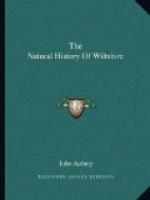Mr. Francis Potter, Rector of Kilmanton, did sett a hive of bees in one of the lances of a paire of scales in a little closet, and found that in summer dayes they gathered about halfe a pound a day; and one day, which he conceived was a honey-dew, they gathered three pounds wanting a quarter. The hive would be something lighter in the morning than at night. Also he tooke five live bees and putt them in a paper, which he did cutt like a grate, and weighed them, and in an hower or two they would wast the weight of three or four wheatcornes. He bids me observe their thighes in a microscope. (Upon the Brenta river, by Padua in Italy, they have hives of bees in open boates; the bees goe out to feed and gather till the honey-dews are spent neer the boate; and then the bee master rows the boate to a fresh place, and by the sinking of the boate knows when to take the honey, &c.- J. Evelyn.)
CHAPTER XIV. OF MEN AND WOEMEN.
[The following instances of remarkable longevity, monstrous births, &c. will suffice to shew the nature of this Chapter. It must be admitted that its contents are unimportant except as matters of curious speculation, and as connected with the several localities referred to.-J. B.]
A PROVERB: -
’Salisbury Plain
Never without a thief or twain.’
As to the temper and complexion of the men and woemen, I have spoken before in the Prolegomena.
As to longæevity, good aire and water doe conduce to it: but the inhabitants are also to tread on dry earth; not nitrous or vitriolate, that hurts the nerves. South and North Wiltshire are wett and dampish soiles. The stone walles in the vale here doe also cast a great and unwholsome dampe. Eighty-four or eighty-five is the age the inhabitants doe rarely exceed. But I have heard my worthy friend George Johnson of Bowdon, Esq., one of the judges in North Wales, say that he did observe in his circuit, sc. Montgomery, Flint, and Denbigh, that men lived there as commonly to an hundred yeares as with us to eighty. Mr. Meredith Lloyd hath seen at Dolkelly, a great parish in Merionithshire, an hundred or more of poore people at eighty yeares of age at church in a morning, who came thither bare-foot and bare-legged a good way. In the chancell of Winterborn Basset lies interred Mr. Ambrose Brown, who died 166-,aged 103 yeares. Old goodwife Dew of Broad Chalke died about 1649, aged 103. She told me she was, I thinke, sixteen yeares old when King Edward the sixth was in this countrie, and that he lost his courtiers, or his courtiers him, a hunting, and found him again in Falston-lane. In the parish of Stanton St. Quintin are but twenty-three houses, and when Mr. Byron was inducted, 167-, here were eight persons of 80 yeares of age. Mr. Thorn. Lyte of Easton-Piers, my mother’s grand- father, died 1626, aged 96; and about 1674 died there old William Kington, a tenant of mine, about 90 yeares of age. A poore woman of Chippenham died about 1684, aged 108 yeares.




